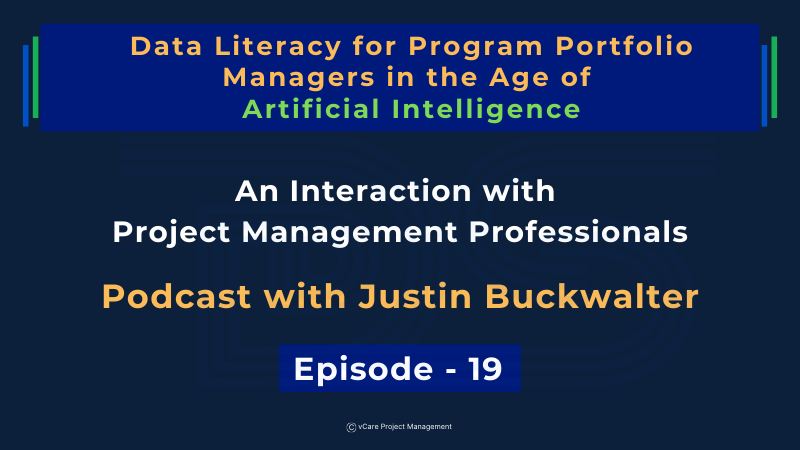
by DharamCW | Sep 13, 2024 | Podcast, Project-Program-Portfolio Management Knowledge
Data Literacy for Program Portfolio Managers in the Age of Artificial Intelligence | Episode 19 | Justin Buckwalter
🔍 Key Takeaways:
– Why has “Data Literacy” become an unspoken prerequisite for business success in the AI-driven era? As a Project/Program Leader, why should you care?
– Why do data governance and data literacy go hand-in-hand?
– How do you measure the success or impact of the initiatives to foster a data culture within the organization? Are there specific KPIs you use to evaluate employee data literacy improvement?
– Given the importance of data sharing and collaboration, how do you balance promoting collaboration while ensuring the security and privacy of sensitive government data in a large-scale Public Private Partnership (PPP) program?
– What familiar challenges are encountered in promoting data literacy within an organization, and what strategies have been most effective in overcoming these challenges?
– How can you create a data-driven culture in your organization to ensure it starts to grow within data literacy and progresses with the data revolution?
– What immediate and long-term strategies should our company employ to navigate the significant impact of generative AI on efficiency, competitiveness, and business model adaptation?
– Which data literacy skills or competencies are essential for Program/Portfolio Managers to enhance their adept handling of intricate datasets for informed decision-making and problem-solving?
– “The more things change, the more they stay the same.” As a Program Manager, do you anticipate drastic changes in AI transformation in organizations?
🎥 Watch now: https://www.youtube.com/watch?v=iUMrtsiphmY
🚀 Seize the opportunity to Elevate Your Project Management Career:
– Register for my upcoming PMI Certification Success Story Webinar: https://bit.ly/4fFJTTn
– Book an obligation-free consultation session on Project management Career, training, and certifications: http://talktodharam.com
– Discover training offers and certification discounts: https://bit.ly/3jWVepD
– Stay updated with our Q&A series and certification success stories by subscribing to the vCare Project Management YouTube channel at https://bit.ly/2YF0wJl
– Follow my podcasts and interviews with Project Management Experts on YouTube at https://bit.ly/2NDY8wd
#DataLiteracy #ProgramManager #PortfolioManager #ProjectManager #AIDrivenEra #DataGovernance #DataCulture #DataLiteracyKPIs #DataSecurity #PgMP #PfMP #PMP #PublicPrivatePartnership #DataDrivenCulture #GenerativeAI #DataCompetencies #DataTransformation #AIIntegration #DataCollaboration #BusinessIntelligence #ProgramManagement #ProjectManagement #PortfolioManagement #PMICertification #AskDharam #DharamSingh #VcareProjectManagement
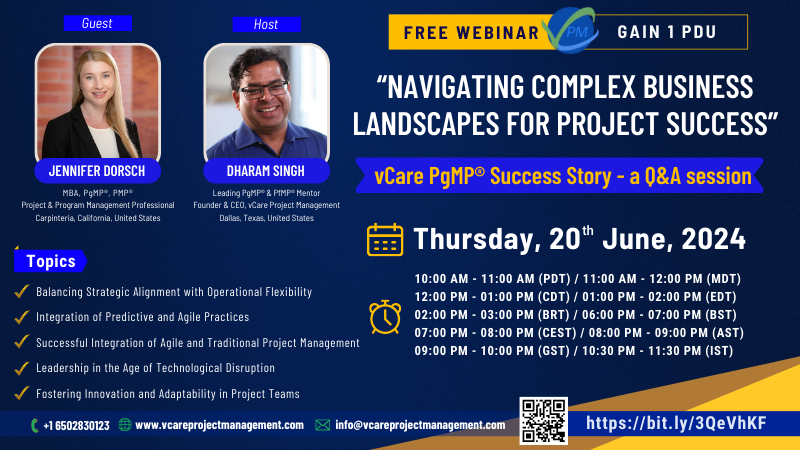
by DharamCW | Jun 7, 2024 | Professional Development Webinars
Navigating Complex Business Landscapes for Project Success | Jennifer Dorsch | 1 PDU | vCare PgMP Success Story
Join me for an upcoming webinar featuring Jennifer Dorsch MBA, PgMP, PMP , a celebrated figure in Business Engineering, Project, and Program Management, who has carved a remarkable career across diverse industries, including specialty chemicals, electronics, medical devices, and pharmaceuticals. Her expertise in these areas, particularly her recent success in passing her PgMP® exam, is highly relevant to senior professionals in Project, Program, and Portfolio Management.
This webinar will cover, among many, the below topics:
+ Balancing Strategic Alignment with Operational Flexibility
+ Integration of Predictive and Agile Practices
+ Successful Integration of Agile and Traditional Project Management
+ Leadership in the Age of Technological Disruption
+ Fostering Innovation and Adaptability in Project Teams
🔗 Reserve your spot now: https://bit.ly/3QeVhKF
Session Date & Time: Thursday, 20th June, 2024
10:00 AM – 11:00 AM (PDT) / 11:00 AM – 12:00 PM (MDT) / 12:00 PM – 01:00 PM (CDT) / 01:00 PM – 02:00 PM (EDT) / 02:00 PM – 03:00 PM (BRT) / 06:00 PM – 07:00 PM (BST) / 07:00 PM – 08:00 PM (CEST) / 08:00 PM – 09: 00 PM (AST) / 09:00 PM – 10:00 PM (GST) / 10:30 PM – 11:30 PM (IST)
By attending this webinar, you can expect to gain from Jennifer Dorsch’s extensive experience, earn 1 PDU, and acquire valuable industry, career, and certification wisdom.
🚀 Elevate Your Project Management Career:
– Book an obligation-free consultation session on Project Management Career, training, and certifications: http://talktodharam.com
– Discover training offers and certification discounts: https://bit.ly/3jWVepD
– Stay updated with our Q&A series and certification success stories by subscribing to the vCare Project Management YouTube channel at https://bit.ly/2YF0wJl
– Follow my podcasts and interviews with Project Management Experts on YouTube at https://bit.ly/2NDY8wd
#ProjectSuccess #BusinessEngineering #ProgramManagement #PgMP #VCarePgMP #PgMPCertification #PgMPExam #StrategicAlignment #OperationalFlexibility #PredictiveAgile #AgileManagement #TechnologicalDisruption #InnovationLeadership #ProjectManagement #PortfolioManagement #ProgramManager #ProjectManager #PortfolioManager #AskDharam #DharamSingh #DharamSinghPgMP #VCareProjectManagement

by Dharam CW2 | Mar 21, 2024 | Professional Development Webinars
Dive deep into the PMI’s latest enhancements to the Program Management Professional (PgMP)® credentials, tailored for senior project, program, and portfolio management professionals.
Registration Link: https://bit.ly/4c9un0j
Session Date : 26th March 2024
Session Time : 10:30 AM – 11:30 AM (PDT) / 11:30 AM – 12:30 PM (MDT) / 12:30 PM – 01:30 PM (CDT) / 01:30 PM – 02:30 PM (EDT) / 02:30 PM – 03:30 PM (BRT) / 05:30 PM – 06:30 PM (GMT) / 06:30 PM – 07:30 PM (CET) / 07:30 PM – 08:30 PM (SAST) / 08:30 PM – 09:30 PM (AST) / 09:30 PM – 10:30 PM (GST)
Webinar Agenda
– Simplified Application Insights: Grasp the updated application’s simplicity, from reduced experience summaries to a wider panel expediting reviews.
– Revised Standard for Program Management: Unpack the 5th Edition’s eight principles, spotlighting Stakeholders and Governance to elevate global program practices.
– Aligned Exam Content: Decode the subtle yet vital changes in the exam outline mirroring the new standard’s language.
– Exclusive PMI Membership Perks: Uncover the benefits, including complimentary access to crucial PMI standards, bolstering your certification pursuits.
– Industry Expertise & Dialogue: During our expert insights, benefit from the wisdom of a seasoned PgMP trainer. Clarify your doubts in our extensive Q&A segment.
– Preparation Roadmap: Walk away confidently with a strategic action plan, essential resources, and community backing to conquer the new PgMP exam.
🚀 Elevate Your Project Management Career:
– Book an obligation-free consultation session on Project management Career, training, and certifications: http://talktodharam.com
– Discover training offers and certification discounts: https://bit.ly/3jWVepD
– Stay updated with our Q&A series and certification success stories by subscribing to the vCare Project Management YouTube channel at https://bit.ly/2YF0wJl
– Follow my podcasts and interviews with Project Management Experts on YouTube at https://bit.ly/2NDY8wd



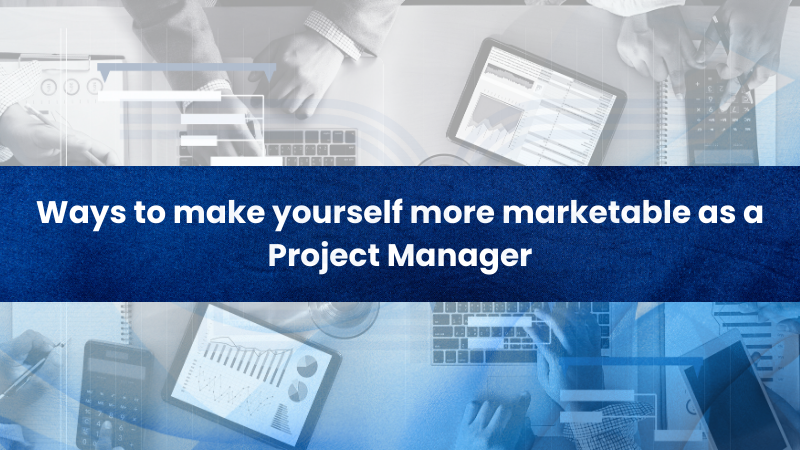
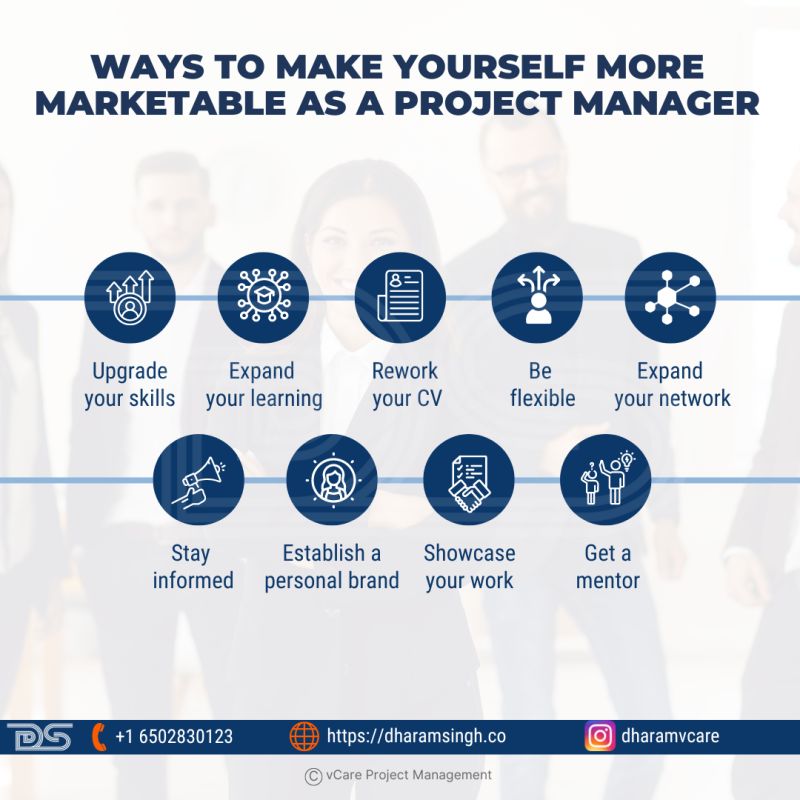
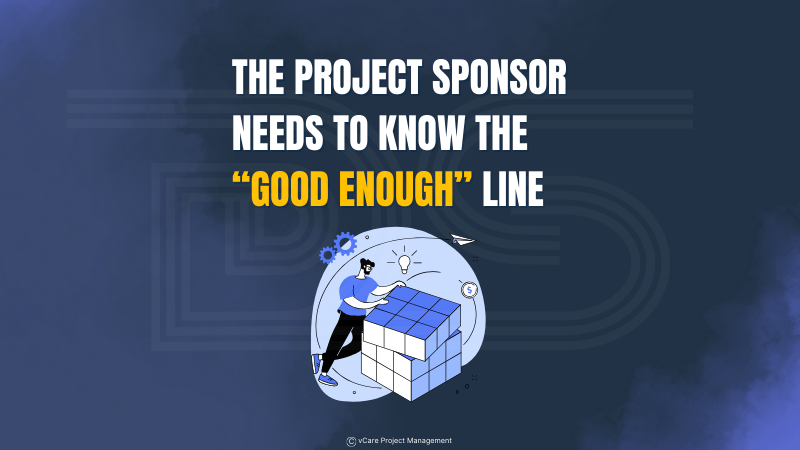




In today’s competitive job market, staying relevant and attractive to employers is crucial for career growth. Here are some key strategies to enhance your marketability at every stage of your career:
+ Upgrade your skills
+ Expand your learning
+ Rework your CV
+ Be flexible
+ Expand your network
+ Stay Informed
+ Establish a personal brand
+ Showcase your work
+ Get a mentor